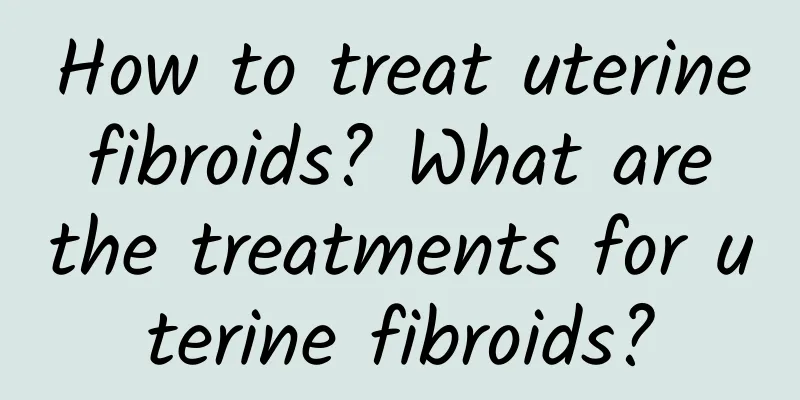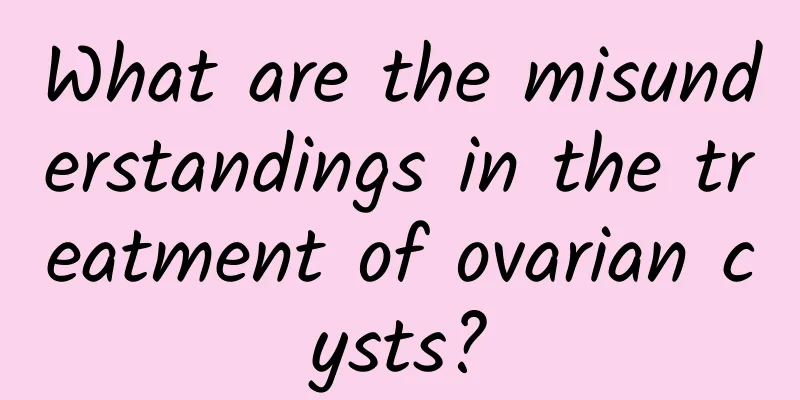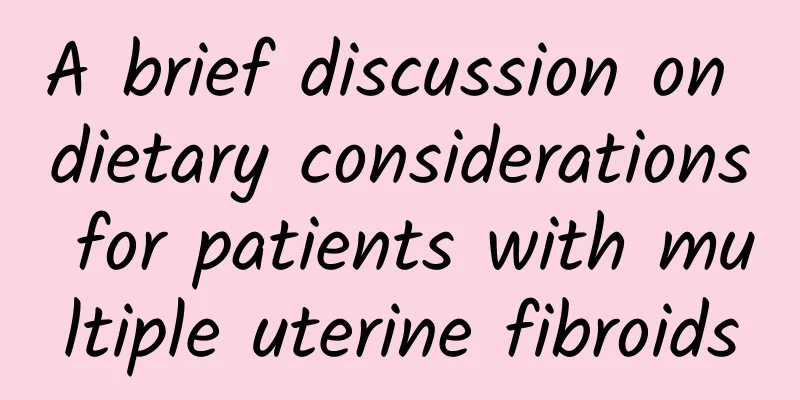How to treat uterine fibroids? What are the treatments for uterine fibroids?

|
How to treat uterine fibroids? I believe many people have this question. Uterine fibroids are a common benign gynecological tumor. Because uterine fibroids can easily affect women's fertility, they must be treated as soon as possible. So how to treat uterine fibroids? Let's listen to the experts' advice. How to treat uterine fibroids: First, surgical treatment. Surgery is the most common treatment for uterine fibroids, because most patients come to see a doctor when uterine fibroids are more dangerous and surgery is the best treatment. The indications for surgical treatment are as follows: ① Large fibroids: If the uterus is enlarged for more than 12 weeks of pregnancy, even if these patients have no symptoms, surgical resection should be performed. ② Excessive menstruation leads to anemia, and conservative treatment is ineffective. ③ Frequent urination, dysuria, constipation, and pelvic pain caused by tumors compressing the bladder or rectum. ④ Fibroids grow in the cervix, broad ligament, or submucosal fibroids. ⑤ Fibroids grow rapidly in a short period of time. Secondly, conservative treatment. Conservative treatment mainly includes expectant treatment and drug treatment. The following four conditions must be met when choosing conservative treatment: (1) the tumor is not more than 6 weeks old; (2) the patient is a postmenopausal patient with asymptomatic uterine fibroids; (3) the patient is near menopause and can reduce bleeding through non-surgical treatment; (4) the patient with uterine fibroids cannot tolerate surgery. Drug treatment: Western medicine treatment has a certain effect on improving the symptoms of patients with uterine fibroids. Androgens can be used for patients with heavy menstrual flow and small fibroids, except for endometrial lesions. In addition, there is also traditional Chinese medicine treatment for uterine fibroids. Expected treatment: For women who are close to menopause, the fibroids grow slowly, the uterus is smaller than 3 months of pregnancy, and there are no symptoms of menorrhagia or compression, only 3 to 6 months of follow-up examinations are required, and the uterine fibroids are expected to shrink after menopause. After menopause, as estrogen secretion decreases, uterine fibroids will gradually shrink without the stimulation of estrogen. However, women with uterine fibroids often have a late menopause, and surgery should still be considered if the fibroids continue to grow or other symptoms occur. As for how to treat uterine fibroids, experts point out that the treatment of uterine fibroids includes conservative treatment and surgical treatment, and a comprehensive decision should be made based on the patient's age, fibroid size and location, fibroid symptoms, and female fertility requirements to achieve the ideal effect. |
<<: Treatment principles for uterine fibroids How to treat uterine fibroids
>>: How to treat benign uterine fibroids? Nursing methods for patients with benign uterine fibroids
Recommend
Enjoy being thin! Eat cold pasta to control weight
After entering autumn, the weather is getting col...
What should I do if I find uterine fibroids during pregnancy? How should I treat uterine fibroids during pregnancy?
Uterine fibroids do not increase the risk of prem...
Does chronic cervicitis cause leg pain in women? Three common symptoms of chronic cervicitis in women
Patients with chronic cervicitis will have abnorm...
What should I eat to reduce or eliminate uterine fibroids?
Uterine fibroids are one of the few common gyneco...
What are the symptoms of uterine prolapse?
What are the symptoms of uterine prolapse? There ...
Is vaginitis a sexually transmitted disease? Can vaginitis be transmitted through sexual intercourse?
Common vaginitis is not a sexually transmitted di...
What are the symptoms of unclean miscarriage?
If after the abortion, the blood continues to be ...
Reduce edema! 2 French slow exercise promotes lower body metabolism
Be careful, sedentary ladies! Maintaining the sam...
What is the cure rate of vulvar itching?
Many female friends have been troubled by vulvar ...
Symptoms of postmenopausal uterine fibroids Can uterine fibroids cause uterine bleeding
For some female friends, uterine fibroids are mor...
How much do you know about the dangers of cervical erosion?
Cervical erosion is a common gynecological diseas...
Why do we need to do B-ultrasound examination before abortion? It is recommended to master these gynecological knowledge before abortion
Why is it necessary to do B-ultrasound examinatio...
If you cut fruits and put them in the refrigerator, will half of the nutrients be lost? Can fruits be put in the refrigerator? Nutritionist to answer
Office workers like to eat fruits, but they are v...
Risks associated with hyperprolactinemia
Hyperprolactinemia is a very common disease and a...
What to do if there is pelvic effusion at 48 days of pregnancy
Pregnancy is a very happy thing, but many women f...









